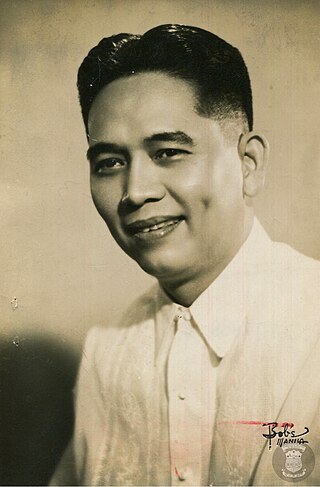
Robert Vincent Salazar Jaworski Sr., also known by his nicknames Sonny, Big J, and Jawo, is a Filipino former professional basketball player, head coach and politician who served as a Senator of the Philippines from 1998 to 2004. He played 23 seasons in the Philippine Basketball Association. He is widely regarded as one of the best and most popular PBA players of all-time. He was named part of the PBA's 40 Greatest Players and was inducted into the PBA Hall of Fame in 2005.
The Philippines men's national basketball team, commonly known as Gilas Pilipinas, is the basketball team representing the Philippines. The team is managed by the Samahang Basketbol ng Pilipinas.

Carlos "Caloy" LoyzagayMatute was a Filipino basketball player, coach and politician. He was the most dominant basketball player of his era in the Philippines and is considered as the greatest Filipino basketball player of all time. Loyzaga was a two-time Olympian, as a member of the Philippine national team.

Basketball is the most popular sport in the Philippines, played on both the amateur and professional levels.

Dionisio "Chito" Calvo was a Filipino basketball player, swimmer, and coach who mentored both the basketball and football national teams of the Philippines. He was one of the greatest Filipino sportsmen in history and helped in the development of both Philippine and Asian basketball.

Ambrosio Bibby Padilla was a Filipino basketball player and an elected member of the Senate of the Philippines. He was one of the most important figures in Asian basketball development.
The Manila Industrial and Commercial Athletic Association (MICAA) was a sports association which existed in Manila, Philippines from 1938 to 1981. Throughout its existence, it staged various sports and was participated by prominent Philippine companies.

The Philippines participated in the 1990 Asian Games held in Beijing, China from September 22 to October 7, 1990. Ranked 13th with 1 gold medal, 2 silver medals and 7 bronze medals with a total of 10 over-all medals.
Carlos Velasco Badion was a Filipino basketball player. Although born in Lubao, Pampanga, he grew up in Tondo, Manila where he started his checkered career playing in sandlot tournaments and for Abad Santos High School in Manila. At 5'11" tall, he was first spotted in an interscholastic tournament by Valerio Lopez of Mapua where he subsequently enrolled. He eventually shone in the NCAA and the MICAA, playing for such teams as the Jacinto Rubber Shoes, Crispa and YCO.
Eduardo C. Lim, also known as Eddie Lim, is a former basketball player like fellow San Beda Red Lions and Hall of Famers Carlos Loyzaga and Antonio Genato. He was a guard who earned the moniker "Stonewall" from sportscaster Willie Hernandez. He sparked San Beda to the NCAA championships in 1951-52 and the National Open tournament, also in 1952. In the Manila Industrial and Commercial Athletic Association, Lim played a key role for multi-titled YCO that won the National Open crown a record seven straight times under coaches Leo Prieto and the late Tito Eduque.
Jaime L. Mariano, also known by his moniker Mr. Cool, is a Filipino former basketball player and coach. Mariano was born in Malabon, Rizal, Philippines. Standing at 6'3 1/2" without shoes, he played primarily the power forward position and could play the small forward and center positions. He became famous as a player for the UE Red Warriors team under Coach Baby Dalupan. He played for Ysmael Steel, Meralco and Concepcion Industries in the Manila Industrial and Commercial Athletic Association. He became known as a deadly shooting big man from the outside before the three point line was popularized. He was elevated to the Philippine Basketball Association in 1975 with Concepcion Carrier. He played for 7 Up from 1976 to 1977. The 7-Up franchise was acquired in 1978 by Filmanbank and Mariano played his final season with Filmanbank. He is the pride and joy of the Marianos of Malabon.
Alfonso R. Márquez, better known as Boy Márquez, was a Filipino basketball player and coach. Márquez was born in Zamboanga City, Philippines.
Ramón Manulat was a Filipino basketball player. He was member of the Philippine National Team that won a gold medal at the 1954 Asian Games and a bronze medal at the 1954 FIBA World Championship. He also participated in the 1956 Summer Olympics, where his country placed seventh. Nationally, he played for the Manila Industrial and Commercial Athletic Association teams Seven-Up and Ysmael Steel.
Felicisimo "Fely" Fajardo was a Filipino basketball player who competed in the 1948 Summer Olympics.
Loreto "Bonnie" Dilema Carbonell was a Filipino basketball player who competed in the 1956 Summer Olympics.
The MERALCO Reddy Kilowatts were a basketball team of the MERALCO Athletic Club owned by the Manila Electric Company (MERALCO) that played in the Manila Industrial and Commercial Athletic Association (MICAA) from 1968 to 1972. Its moniker and mascot, Reddy Kilowatt, was a licensed branding character used by the company during that period. The company briefly joined the MICAA prior to World War II and was re-admitted in 1968.
Francisco "Kiko" Calilan is a Filipino former basketball player who competed in the 1951 Asian Games.

Joaquín Loyzaga Sr. was a Filipino international footballer who has played in the Far Eastern Championship Games, the precursor of the Asian Games.

The Letran Knights basketball is the collegiate men’s basketball program of the Colegio de San Juan de Letran. The Knights have won 20 championships since joining the National Collegiate Athletic Association (NCAA). It is the second winningest team in the NCAA, just behind the San Beda Red Lions.
The Philippines men's national basketball team won the bronze medal at the 1954 FIBA World Championship held in Brazil. Since the 2014, the event is known as the FIBA Basketball World Cup. This is also the Philippines' first appearance in the tournament.







